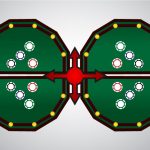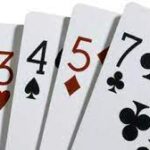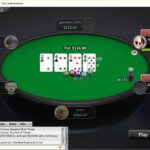There are a lot of factors that go into becoming a winning poker player that do not happen while you are actually playing the game. Whether playing for fun, to earn a bit of side money, or professionally, there are many things one can do to improve their play while they are not at the tables. Some of the more obvious examples are studying the game, joining peer review groups, and watching videos or reading strategy articles. Other ideas that get overlooked include controlling tilt, physical preparedness, and your mental mindset.
Studying/Analyzing Your Game
There is one sure fire way to get better at poker: Study. There are many ways to break down and analyze your play including hand history review, database review, and peer groups. All of these methods should lead to bigger winrates, plugging leaks, and more money.
Hand History Review
Looking over your past hands, whether they were big/small pots or winner/losers, can be a big help to improving your play. Sometimes, it is as simple as seeing the evidence of a poor decision that helps you to stop making an error. Other times it is noticing your opponent’s tendencies and formulating a strategy to exploit their weaknesses. Finally, looking over hand histories might provide an overall look at your game. You might notice you aren’t playing a lot of hands, or have not been re-raising enough in good spots to do so. Most people will go into their Poker tracking database and just pick out all the biggest losers from their last session. While this may be lead to some progress, there can be times where you lost hands where you played perfectly and won pots where your play was less than optimal.
How can you know which hand histories to look at? There is no perfect answer here. The best answer might be, look at all of them! What I like to do is focus on one certain aspect, such as turn play, or light 3-betting pre-flop, etc… and sort my database to find as many of these spots as possible. From there I run through each hand history and break down every option. That is the key. From observing some of the best players in the world I took away one very important note: the most obvious option is not always the correct one. Take your time with each hand history and pick apart each and every decision. There might be some spots where you start to question even the most standard plays. When this happens you are going to get better, because you are willing to change.
Database Review
Much like spending hours looking over hand histories, reviewing your database can be a bit monotonous. However, there is no understating the importance of reviewing your stats and finding major leaks in your game. The best places to look in your database will be at your positional stats which break down the amount of hands you play (and raise) before the flop from each spot at the table. The idea here should be to see a progressively looser and more aggressive style as you approach the button. The later your position at the table, the more willing you should be to open up your game and use your position to your advantage. If you find you are playing a similar percentage of hands from all positions, you need to rectify the situation immediately by either tightening up from early position and the blinds or, more commonly, loosen up from the cut-off and button. Another great use for databases is to sort your opponents and break down hand histories you have played against some of your tougher villains. By breaking down their games and tendencies you will be armed with much more information when you find yourself at their table
Peer Study Groups
This is one of the newer ways to study and improve your poker game. By finding players to discuss the game with you can open your mind to entirely new ways of thinking about poker. Programs such as Skype, Ventrillo, and teamviewer have allowed players to connect in ways which allow for mass communication and have opened up new ideas for improving one’s play. There are a few caveats to these study groups, including working with players of equal or lesser skill levels. The term "blind leading the blind" more than applies to these situations where players with poor fundaments and understanding of poker get together and spread their mediocre ideas.
The key is to have a good balance between people in your group. You want players who play higher stakes as well as those who play lower stakes. With a wide variety of skill levels and thus different levels of poker abilities, you will be able to have some interesting conversations which for the open-minded player will be quite beneficial. Befriending higher-stakes players can be difficult, but if you get the opportunity to do so you will not regret it. Be respectful of their opinions and do not complain to them about $10 bad beats when they are playing much higher stakes and losing pots 100x that size.
Tilt Control
Many a good poker player has been destroyed by tilt. For those unfamiliar with the term, "tilt" is typically what happens when a player loses a big pot (sometimes due to a bad beat) and then goes on to play quite recklessly all the while losing a lot more money. As you can probably tell, tilt is a bankroll killer which can set the casual player back a long way and can cost professional players a lot of their earnings. Players must be able to control tilt or they will have a lot of trouble moving up in stakes or sustaining a solid winrate. There are a few good ways to control tilt, experimenting with each will help you determine which is best.
Identifying tilt might just be the hardest part and if you are unable to catch it before it happens you could be in for a world of hurt. Noticing when you begin to feel agitated or irritable and then stepping away from the game is always going to be the best decision you can make. However, there are some situations where you cannot leave, such as in a tournament or if there is a huge fish at a cash game table. When this happens you can sit out for a few moments, take some deep breaths, and remind yourself that you are playing poker to make money and tilting is counterproductive to that goal. If a break in the tournament comes up, try going for a short walk outside and clearing your head. In the end it is up to you. If you are committed to staying calm and not tilting, you will become a better poker player and your bankroll with thank you.
A discussion on controlling tilt would not be complete with out touching on "reverse titling" which is a player’s tendency to shut down or call it a day after booking a win early on in their session. Reverse-tilting can cost players as much or even more money than actual tilt as players shy away from losing their quick earnings by either playing too tight or just shutting their tables down and quitting for the day. Not only will players not earn any more money on the day, but they are costing themselves a lot of expected value as you tend to be playing your best when you win money. Shying away from these situations is a sure fire way to cost yourself some long term profit.
Physical Preparedness
This section can be broken down into three key components: diet, exercise, and sleep. This might be the most overlooked aspect of being a professional poker player and one that can pay huge long term dividends. You cannot underestimate the damage your body takes sitting in a computer chair all day long while staring at a monitor. However, being a poker player is not a death sentence, and just a few small tweaks can make you better of than non desk-jockeys.
Diet – "Diet" does not mean eating little to no food in an attempt to lose weight. The term diet refers to the amount of food and its make-up. One of the hardest parts about sitting down at your computer all day is figuring out when to eat. Unfortunately convenience is commonly chosen over substance when picking the types of food to eat during a session. For most, a personal chef is not a viable option and thus we must prepare our own meals or purchase them from the store. When creating a diet plan around poker try choosing smaller meals with high nutritional value. Items such as lean meats, vegetables, fruits, and nuts are great ways to get in proper macronutrients while not eating huge meals which can create some bad feelings while sitting in front of your computer. When trying to lose weight dietary protein should come first; set your protein intake and then fill in the gaps with veggies and fruits. Players should try to stay away from massive amounts of caffeine, fats, and sugars around their sessions.
Exercise – Most people assume exercising is hopping on a treadmill and jogging for 20 minutes. While this is better than nothing, it is much worse than other options which are readily available to all. Players who spend a lot of time in their computer chair can acquire some pretty bad posture which will stick with them for the rest of their lives if not corrected. The best exercise program is a combination of heavy weight training along with some sort of cardiovascular work. When dealing with weight training, keeping things simple is always the best approach. A good example of this is "Starting Strength" by Mark Rippetoe which covers five basic barbell lifts and gives those new to lifting an easy to follow 3 day a week program for getting stronger and building muscle. In terms of cardio, nothing beats a long walk. Walks are great not only for burning calories and improving hearth health, but they also can help clear your mind after a long session or put you at ease before you sit down to grind. If you enjoy running or biking those are great ways to stay in shape, although they will tend to put your body through the ringer much like sitting in front of a computer will. Improving posture is important as well. Working with a strength program will help as will focusing on some mobility exercises which can be found by searching for fitness expert Eric Cressey.
Sleep – Poker players stare at a monitor all day long. This causes a lot of stress on the eyes and mind and can significantly upset your body’s natural routine. Getting a good night’s rest is important to stay fresh and maintain a positive mindset. Poker players also have trouble sticking with a schedule. Sometimes you might find yourself having to stay up until 4AM as you get deep in a tournament all the while knowing you have to wake up at 8AM to go to work the next day. For those who play poker professionally keeping with a schedule can pay huge dividends. Try getting to bed and waking up at the same time each and every day. Sure, there are going to be times where this is impossible, but committing to sticking with a schedule will help you stay fresh and remain in the proper mindset for making correct decisions at the poker table.
There you have it, so much more to playing poker than just sitting at the table and going through the motions. If you can implement any of the suggestions above, you will without a doubt be better off for it.
Submit your review | |









